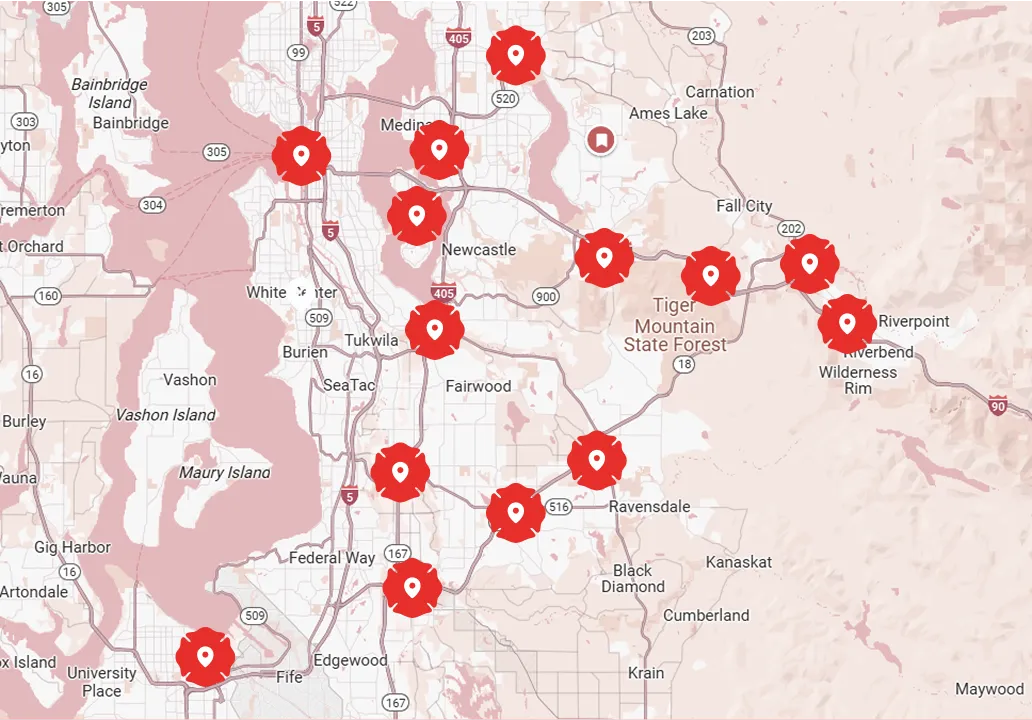Interstate Movers in Sammamish, WA
.webp)
Interstate moving services in Sammamish, WA handle complex cross-state relocations with full FMCSA compliance, proper licensing, and precise logistics. Our team ensures all moves include the required USDOT and MC numbers, offers insurance options such as released value, full value, or third-party coverage, and emphasizes detailed inventories, secure packing, and timely delivery. We plan around local challenges like restricted curb access and seasonal traffic, while guiding homeowners on preparation, route coordination, and documentation to ensure a smooth, compliant relocation.

Interstate Movers in Sammamish, WA
Moving across state lines is one of the most complex relocations a household can make. For homeowners in Sammamish, WA, an interstate move brings additional planning needs: compliance with federal and state regulations, careful scheduling to avoid local traffic and weather disruptions, and clear protection for your belongings while they transit multiple jurisdictions. This page outlines the practical steps, regulatory requirements, insurance options, and coordination you should expect from professional interstate moving services in Sammamish so you can make an informed decision.
Why specialized interstate moving services matter in Sammamish
Sammamish’s hillside neighborhoods, narrow residential streets, and seasonal weather patterns (wet, slippery roads in winter and peak moving traffic in summer) influence how an interstate move is executed. Local parking restrictions, homeowner association rules, and limited curb access can require special truck routing, short-term permits, or additional labor for shuttle services. Choosing experienced Moving Interstate Movers in Sammamish, WA reduces surprises because they plan around these local nuances while fulfilling federal compliance and multi-state logistics.
Common interstate moving issues in Sammamish
- Limited curb access and steep driveways that require smaller shuttle vehicles or longer carries
- Seasonal weather delays during wet winters or holiday traffic spikes
- Plant and agricultural restrictions when crossing state lines
- Complexity of vehicle transport and registration when relocating out of state
- Confusion over valuation coverage and claims if items are damaged in transit
Addressing these common challenges early prevents delays and unexpected costs.
How compliance and licensing work for interstate moves
Interstate moves are regulated primarily by the Federal Motor Carrier Safety Administration (FMCSA). Key compliance elements to verify:
- USDOT number: Identifies the carrier for safety ratings and inspection history.
- MC number (Motor Carrier number): Required authority to transport household goods across state lines.
- Proof of active registration and compliance with FMCSA safety standards.
- State-level registration or permits when required for certain routes or oversized loads.
Professional carriers will include their DOT and MC numbers on estimates and paperwork and maintain required vehicle inspections, driver qualifications, and safety records. In Washington, movers also need to follow applicable state transportation rules for intrastate activity; reputable interstate movers will be familiar with both federal and Washington regulations.
Claims and transit insurance explained
Understanding protection for your belongings is critical before any interstate move. Typical options include:
- Released value protection: Basic, low-cost coverage based on weight. Limits are per pound per article and may not cover full replacement value.
- Full value protection: Carrier agrees to repair, replace, or pay the current market value for lost or damaged items. This offers more complete coverage but has specific exclusions and deductibles.
- Third-party transit insurance: Independent insurers provide supplemental coverage for high-value items or specific risks not covered by carrier plans.
Key claims process points:
- An itemized inventory and condition report (often called a bill of lading and room-by-room inventory) should be completed and signed before loading.
- Inspect goods at delivery and note any damage on the delivery receipt immediately.
- Claims must be filed within deadlines specified in the bill of lading; keep photos, receipts, and records of value.
- Retain paperwork for any repairs, replacements, or appraisals to support a claim.
Scheduling, pickup and delivery windows
Interstate moves require careful time-of-day and route planning. Expect these scheduling elements:
- Pickup windows: Carriers typically provide a 2 to 4 hour pickup window for your scheduled day. For moves in neighborhoods like Sammamish with restricted access, expect earlier planning and possible congestion fees for off-hour operations.
- Transit times: Determined by distance, route, and consolidation. Local to West Coast destinations may be 1 to 5 days; longer cross-country moves extend accordingly. Consolidated shipments (shared trucks) are cost-efficient but have broader delivery windows.
- Delivery windows: Delivery dates often arrive as a multi-day window. Carriers will narrow the arrival window as the truck nears your destination and provide updates.
- Scheduling flexibility: Good movers coordinate with you on preferred delivery dates, backup plans for weather, and permit requirements for temporary parking or loading zones.
Preparing your Sammamish home for an interstate move
Proper preparation speeds loading and reduces the risk of damage.
- Create a detailed inventory and label boxes by room and priority for unpacking.
- Disassemble large furniture and secure loose parts in labeled bags.
- Safeguard important documents, jewelry, prescriptions, and valuables by transporting them personally.
- Disconnect appliances and ensure they are dry and secured for transport.
- Note plant and animal transport restrictions for your destination state; some plants and certain animal movement may be prohibited or require certificates.
- Inform neighbors and parking enforcement when a large truck will occupy street space to avoid citations or to arrange temporary permits.
How professionals coordinate multi-state logistics
Coordinating an interstate move combines door-to-door service with cross-jurisdictional planning:
- Route planning that accounts for weight limits, low bridges, and restricted roads.
- Coordination with state authorities for oversize permits if needed.
- Use of relay networks or partner carriers to maintain schedules across long distances.
- Real-time tracking and communication so you receive updated ETAs and status reports.
- Consolidation options for cost efficiency, and private dispatch for direct loads when time is critical.
Experienced movers also anticipate seasonal bottlenecks—summer weekends, end-of-month moves, and holiday closures—and recommend optimal booking windows to avoid delays.
Benefits of timely planning and post-move tips
Planning ahead reduces stress, costs, and claims risk:
- Book interstate moving services well in advance, especially for summer months.
- Keep an organized moving file with quotes, DOT/MC numbers, inventories, receipts, and insurance documents.
- Document the condition of high-value items with photos before the move.
- After delivery, inspect items immediately and report any issues per the bill of lading instructions.
An interstate move from Sammamish requires partners who understand FMCSA regulations, Washington-specific considerations, and local logistics. Knowing what to expect about licensing, insurance, scheduling, and preparation empowers you to make confident decisions and protect your belongings throughout a multi-state move.

